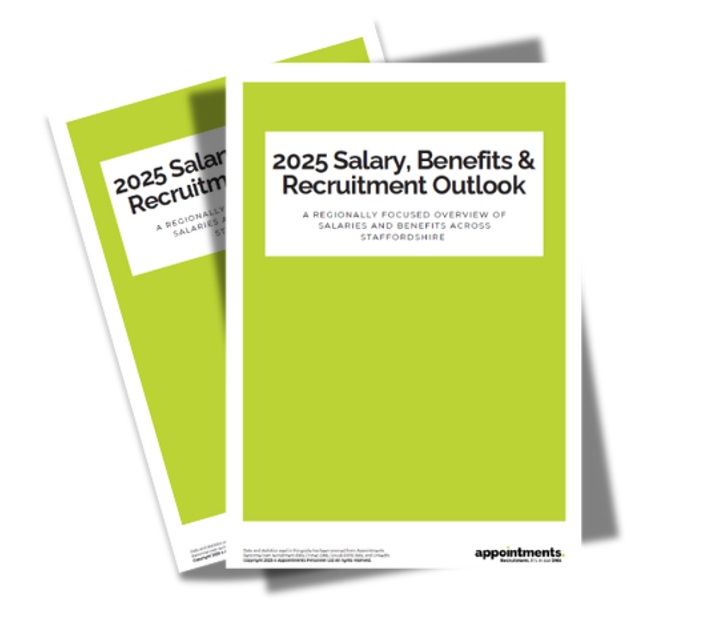
Share Article
12 Tips on finding a new job quickly
ave you decided it’s time to start looking for a new job in the New Year?
As inflation puts a squeeze on household finances, many are looking at moving to a new job with a better salary. The labour market continues to see businesses recruiting and a shortage of candidates has seen companies offering new recruits attractive salaries to get them on board.
Our tips will help you bag that dream job quickly
To save yourself lots of time, it’s a good idea to have a targeted approach to increase your chances of finding something quickly and make sure that your next job is right for you. We’ve pulled together 12 tips to help you keep your job search focussed and get results quickly.
1. What does your new role look like?
Although it might be tempting to dive straight into applying for any job, before you start, have a good think about what you want for your next role. Be realistic about the level of job you’re applying for, it’s good to aim higher but don’t overstretch yourself for your next move. Use LinkedIn and job boards to research the companies and job roles available in your usual job sector. Many of the skills you have will be transferrable too, so think about where these would fit into other job fields.
Now that you have a better idea about what you are looking for, you can have a more targeted approach to your job search.
2. Make sure your CV and covering letter are ready
You’ll have move success when applying for jobs if your CV is tailored for different types of roles. If you are widening your horizons, don’t just update your CV with your latest experience. By creating different versions of your CV to match the different job roles will increase your chances of being shortlisted. The same rule applies to your covering letter too.
Recruiters will be able to tell if you haven’t bothered to tailor your CV and covering letter to the role you are applying for. Think of your CV as a work in progress that you constantly tweak to fit the particular skills needed for a job. A tailored CV shows that you’ve put some work into your job application. We give lots of useful advice in our blog about writing your CV and writing your covering letter.
3. Sign up to relevant job boards
Make sure you sign up to alerts on job boards for both companies and roles, as well as broader job fields. Once you’ve registered think more specifically about your job sector or position. Are there industry-specific forums or publications with job boards? Websites like Mumsnet and sectors like the NHS and universities have their own job boards, as do sector magazines like Marketing Week.
4. Make use of recruiters and word of mouth
A good recruitment agency will want to know as much about you as possible and what you are looking for. They’ll also be able to give you lots of useful advice and support in your job search. Sign up for their job alert emails so you know when the latest jobs are advertised and get in touch if there is something you are really interested in. By signing up with a recruitment agency, like Appointments Personnel, you’ll benefit from the support of a recruitment consultant to help you with your job search.
LinkedIn is a key recruiting platform; also consider Facebook groups in your chosen field. Follow your target companies on their social media platforms as they often post about new opportunities. Don’t forget to also use your own professional network and friends and family too. Lots of companies offer staff referral incentives, so let people know you’re looking for a new job.
5. Think about new locations
Think about where you would be willing to work. If you have always had to commute, think about whether it’s more important to you to work closer to home, or maybe hybrid working would suit you better to save on fuel. Look at google maps, checking out travel times to different locations, there may be areas that you can commute to that you haven’t considered before. Or maybe there are good train links that would cut down on commute times.
6. Work on your weaker skills
When you’re looking for a new job, be honest with yourself about what your strengths are and where your weaknesses are. Identifying your strengths will help you think about where you would be able to add value to a future role.
Everyone has areas they are not so good at, but you can work on these. Maybe you could take on part-time or evening work to help fill a gap. Are there online training courses you could complete to complement your current skills. Consider whether doing some volunteer work would help give you more experience in your weaker areas.
7. Prioritise your job applications
Treat your job search like a project. Organise yourself – making a list of jobs, when their deadlines are, job title, type of role, name of the recruiter with contact information and what’s the status of your application, will help you prioritise.
Identify which jobs are most suitable for you and which are you more likely to succeed in. Asking yourself these questions will help you decide which to apply for first, it’ll also help make sure you don’t miss any deadlines and know when to prepare for an interview if your application is successful.
Don’t leave applications to the last minute, a lot of companies interview potential candidates as they receive their applications now. As soon as they find someone suitable, they may stop looking and you’ll miss your opportunity.
8. Make sure your Social Media profile works for you
It shouldn’t come as a surprise that employers and recruiters look at the social media profiles of prospective employees. Make sure your profile photos and privacy settings are appropriate. Does what you are sharing in the public domain create the right impression to a future employer.
Use your social media platforms especially LinkedIn to show your interest and skill in a type of role. Make sure you link to relevant people and groups to build up a professional profile. Engage with other professionals in your line of work. But make sure it’s people you know or have some connection with. Maybe you’ve been on a training course with them in the past or you use to work with them.
Once your LinkedIn profile is up to date, don’t forget to check your messages regularly, a recruiter may be trying to get in touch with you to suggest a suitable job to you.
If you need help getting your LinkedIn profile into shape check out our LinkedIn profile blog.
Or sign up to our LinkedIn Workshop Webinar to get more advice on improving your social media profile.
9. Fine tune your interview technique
There are so many things to keep in mind when job searching. Create a checklist of things to remember, include or do, for each application and interview. Keep a copy of your application, names of relevant people as well as details and timings of interviews. Research the people conducting the interview. Link into their social media, look up any media coverage relating to that sector, and prepare questions in advance to ask at interview. Rehearse your answers out loud, such as describing yourself and your ambitions, so that you’re ready with answers and don’t forget important points. Keep positive and upbeat, your body language and tone of voice are key to making a great 1st impression during an interview.
To help you prepare to impress at your interview, check out our blog about Interview techniques
Or Sign up to our Interview Technique webinar to help you fine tune your interview techniques.
10. Are you ready to try a different approach?
Whilst you’re looking consider temping – often this work can lead to permanent opportunities that aren’t promoted elsewhere. Also, you can use the experience to expose you to other environments and this could help you narrow down what type of work you’re interested in. If you do go down the temporary route, make sure you’re familiar with your basic employment rights. Check out our temping job opportunities here.
11. keep looking and Keep your options open
Just because you’ve been asked to attend an interview doesn’t mean the job is yours. Keep searching and applying for roles that are good for you. The interview may just affirm that this company isn’t right for you, so it’s important to keep your job pipeline flowing whilst you are looking.
12. Remember to Stay positive
If an interview doesn’t go well, you can learn from the experience to do better next time, so don’t be too hard on yourself. If you haven’t been interviewed for a while you are bound to be a bit rusty. Like anything else in life, your interview performance will improve with practise. Also it’s good to remember that the interview process is two way. You’re checking that the job it a good fit for you too. You never know the next job you apply for could be the ideal one that you’ve been searching for.
To get more support from us to help you with your job search get in touch with us or upload your CV.










